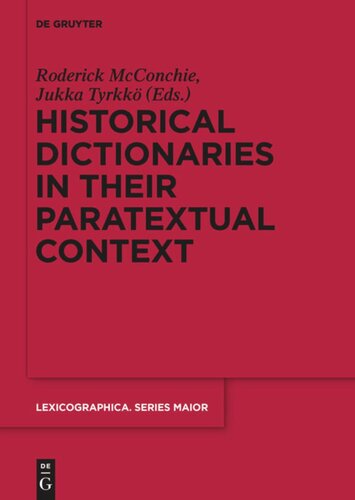

Most ebook files are in PDF format, so you can easily read them using various software such as Foxit Reader or directly on the Google Chrome browser.
Some ebook files are released by publishers in other formats such as .awz, .mobi, .epub, .fb2, etc. You may need to install specific software to read these formats on mobile/PC, such as Calibre.
Please read the tutorial at this link: https://ebookbell.com/faq
We offer FREE conversion to the popular formats you request; however, this may take some time. Therefore, right after payment, please email us, and we will try to provide the service as quickly as possible.
For some exceptional file formats or broken links (if any), please refrain from opening any disputes. Instead, email us first, and we will try to assist within a maximum of 6 hours.
EbookBell Team

4.7
56 reviewsBoth dictionary and paratext research have emerged recently as widely-recognised research areas of intrinsic interest. This collection represents an attempt to place dictionaries within the paratextual context for the first time. This volume covers paratextual concerns, including dictionary production and use, questions concerning compilers, publishers, patrons and subscribers, and their cultural embedding generally. This book raises questions such as who compiled dictionaries and what cultural, linguistic and scientific notions drove this process. What influence did the professional interests, life experience, and social connexions of the lexicographer have? Who published dictionaries and why, and what do the forematter, backmatter, and supplements tell us? Lexicographers edited, adapted and improved earlier works, leaving copies with marginalia which illuminate working methods. Individual copies offer a history of ownership through marginalia, signatures, dates, places, and library stamps. Further questions concern how dictionaries were sold, who patronised them, subscribed to them, and how they came to various libraries.